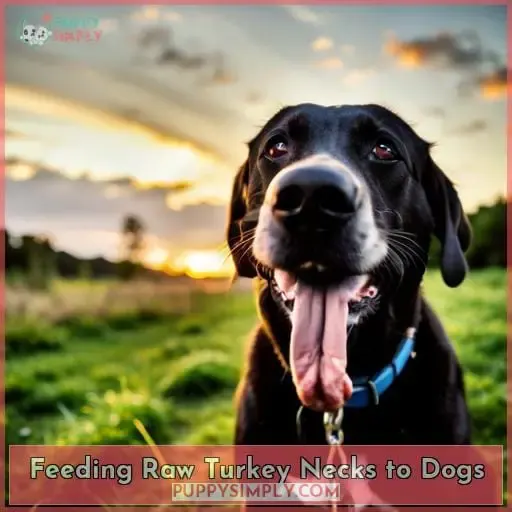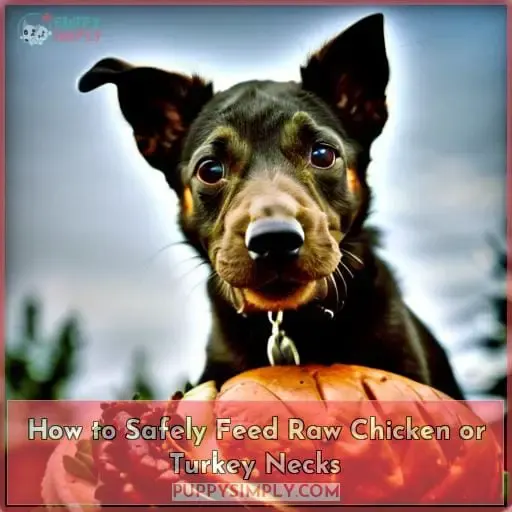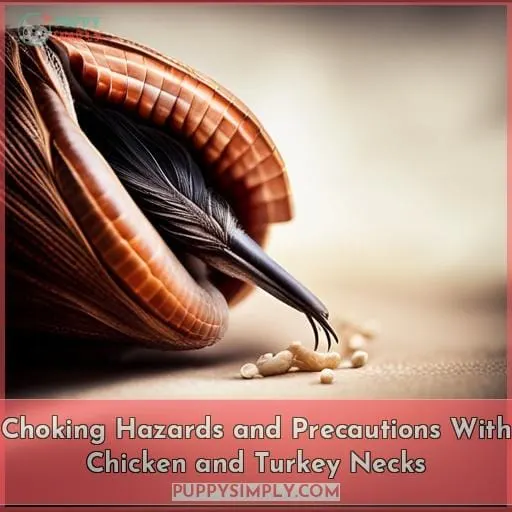This site is supported by our readers. We may earn a commission, at no cost to you, if you purchase through links.
 Do you want to know the answer to the age-old question: can dogs eat a raw turkey neck? If so, you’ve come to the right place.
Do you want to know the answer to the age-old question: can dogs eat a raw turkey neck? If so, you’ve come to the right place.
As many pet owners have discovered, raw or dehydrated turkey necks are not only safe for your pup – they even offer plenty of nutritional benefits! From joint and mobility support through glucosamine and chondroitin found in poultry necks, as well as mental stimulation from chewing on them – there’s plenty that these chewy treats can do for your canine friend.
Let’s explore these benefits further while learning where to find raw turkey necks and how best (and safely) prepare them for consumption by our furry friends!
Table Of Contents
- Key Takeaways
- Are Turkey Necks Safe for Dogs?
- Benefits of Turkey Necks for Dogs
- Where to Find Raw Turkey Necks for Dogs
- Considerations for Feeding Turkey Necks to Dogs
- Feeding Raw Turkey Necks to Dogs
- How to Safely Feed Raw Chicken or Turkey Necks
- Choking Hazards and Precautions With Chicken and Turkey Necks
- Frequently Asked Questions (FAQs)
- Conclusion
Key Takeaways
- Raw or dehydrated turkey necks are safe and nutritious for dogs.
- Turkey necks provide high-quality protein, trace minerals, and essential vitamins.
- Chewing on turkey necks improves dental hygiene and promotes mental stimulation.
- Proper portion control and supervision are important when feeding turkey necks to dogs.
Are Turkey Necks Safe for Dogs?
You and your pup can reap the health benefits of turkey necks, as long as you choose the right type for their size and age. Turkey necks contain high-quality protein along with trace minerals that are beneficial to a canine’s diet.
Additionally, they provide glucosamine and chondroitin, which help support joint health in dogs. They also help improve dental hygiene by removing plaque and tartar buildup on teeth when chewed correctly.
Raw or freeze-dried poultry bones offer numerous nutritional advantages, but cooked bones should be avoided due to the risk of splintering, which can cause potential injury or choking hazards if swallowed whole without being chewed first.
Raw turkey necks add variety to a dog’s diet while providing essential nutrients such as calcium, phosphorus, glucosamine, and chondroitin – all important for maintaining healthy joints and muscles – plus vitamins and minerals needed for overall wellbeing.
Start slow when introducing them into a pet’s meal plan; one neck per day is sufficient depending upon the size of the breed, dog activity level, and other factors related to dietary needs (age, etc).
If you opt instead for dehydrated snacks, these can be purchased online or from pet supply stores – however, it is best practice to always avoid buying products imported from China!
Finally, do not forget that chicken feet serve as an excellent source of nutrition too, so consider adding these occasionally to your pooch’s menu.
Benefits of Turkey Necks for Dogs
Greeting pet owners! Turkey necks are a great source of nutrition for dogs, providing numerous benefits to their overall health. Not only do they offer high-quality protein and trace minerals, but glucosamine and chondroitin in turkey necks can help support joint mobility while also aiding dental hygiene by removing plaque buildup on teeth.
Nutritional Benefits
The nutritional benefits of turkey necks are vast, providing your pup with essential vitamins and minerals for overall well-being. Turkey necks are rich in calcium and phosphorus. The connective tissue of these treats helps to form strong bones and muscles.
Glucosamine and chondroitin assist in maintaining joint health. Raw bones provide a natural source for important trace minerals and exercise the jaw muscles during chewing sessions. Feeding raw meaty bones can also help prevent arthritis by aiding digestion, as canine digestive systems were designed specifically to process them.
Turkey necks are not only a great snack or treat option that adds variety to your pet’s diet, but they also offer an array of other advantages.
Joint and Mobility Benefits
By chewing on turkey necks, you can help keep your pup’s mobility in top shape by providing natural glucosamine and chondroitin for joint health. Turkey necks are a great source of bone-building nutrition to aid in healthy teeth and gums.
Senior dogs with mobility issues or arthritis benefit from the cartilage found in raw turkey necks as part of their diet. Duck necks, dehydrated turkey necks, and freeze-dried chicken neck treats offer many flavors to suit large breeds, while small dog owners may choose smaller chicken neck treats.
Raw diets also include raw poultry wings, as well as hearts, gizzards, and feet for added nutrients that contribute to overall wellbeing.
Dental Benefits
Chewing on turkey necks can help improve your pup’s dental health by removing plaque and tartar, promoting healthy gums. The bone structure of these poultry necks helps clean the teeth while providing essential minerals like phosphorus to support strong bones.
Additionally, raw feeding with meaty bones has been linked to improved oral hygiene as well as a stronger immune system for dogs.
Raw diets also include other nutritious parts of the bird such as hearts, gizzards, and feet—all supporting complete nourishment that contributes to overall wellbeing in pups everywhere!
With all these benefits combined, it’s clear that offering your pooch some delicious poultry necks is an excellent way to ensure balanced nutrition at mealtime.
Mental and Overall Health Benefits
Giving your pup poultry necks not only keeps their teeth and gums healthy, but it can also give them a mental boost and provide overall health benefits. The psychological impact of chewing raw meaty bones promotes increased social interaction amongst dogs.
The dietary balance from raw duck necks helps improve digestive health. Additionally, they offer essential minerals for bone health that are hard to find in an affordable source otherwise. Raw chicken or turkey necks are great options for providing mental stimulation by encouraging playtime activities like fetching or tugging games! Moreover, feeding these treats regularly will help ensure balanced nutrition through natural sources such as mineral-rich organs found in a variety of edible bones.
Where to Find Raw Turkey Necks for Dogs
You can find raw turkey necks for your pup like a hidden treasure – from farmers markets to pet supply stores, these nutritious treats are sure to be the highlight of mealtime.
To ensure freshness and quality, look no further than local grocery stores or farmer’s markets where you can buy locally sourced products. You may also purchase dehydrated turkey necks online from reputable sources or in pet supplies stores.
For senior dogs and those with tooth issues, consider frozen chicken wings instead as they are easier on teeth but still provide essential nutrients such as protein and calcium that support overall health.
Raw poultry necks offer many nutritional benefits when included in a balanced diet for all sizes of pups; however, smaller breeds should opt for chicken neck bones rather than larger ones made from turkeys due to size differences between breeds.
Raw feeders will benefit greatly by incorporating raw poultry into their dog’s diets since it contains vital minerals like calcium & phosphorus which is great for healthy bones & muscle development while exercising the jaws at the same time!
Keep an eye out when feeding as some dogs have been known to swallow whole, so supervision is key here too! Additionally, make sure if you’re offering outdoors then designate one area away from other animals/children, etc.
All things considered, there’s loads of variety possible including hearts, gizzards, feet, and even turkey giblets which are safe and nutritionally sound options ensuring your furry friend has everything needed to live life to its fullest potential without compromising safety along the way either!
Considerations for Feeding Turkey Necks to Dogs
When feeding turkey necks to your pup, supervision is essential to ensure they’re enjoying a safe and healthy snack. Turkey necks offer many nutritional benefits for dogs of all ages, including high-quality protein and trace minerals.
They also provide glucosamine and chondroitin for joint health. Chewing on these treats helps remove plaque and tartar from teeth, improving dental health.
Raw poultry necks provide calcium and phosphorus, which support strong bones and muscles. This makes them a great option for raw diets or creating bone broth. However, for senior dogs or those with teeth issues, frozen chicken wings may be more suitable due to size differences between breeds.
It’s important to note that cooked poultry bones should always be avoided by any pooch. Feeding habits should also take into consideration activity levels. Smaller pups will need less than larger ones.
Regardless, it’s important not to overdo it since excess consumption can cause digestive problems. Consulting with dog trainers before introducing new foods like this into their diet plans is best practice if unsure about safety protocols associated with its use.
To help make sure everything goes smoothly during mealtime, there are several precautions you must take. Always look out for signs of choking while supervising feedings. Avoid buying products imported from China.
Discourage gulping by holding one end of the neck while eating. Pick appropriate sizes based on breed type (smaller = chicken neck bones). Start slow when introducing raw meats/bones such as turkey necks. Providing fresh water alongside meals is recommended too! Finally, designate dedicated areas outdoors where messes won’t occur if opting against inside feedings.
This way, both pet parents and pups alike get maximum enjoyment without sacrificing overall safety.
Feeding Raw Turkey Necks to Dogs
Offering up raw turkey necks to your pup is like giving them a delicious, nutritious gift – one that’s sure to have their tail wagging with excitement! Raw turkey necks offer many health benefits for canine companions of all sizes.
They are rich in protein and minerals such as calcium and phosphorus. These digestible chews provide the makings of bone broth while also exercising the jaws and cleaning teeth. The glucosamine found in some poultry bones can even help prevent arthritis in senior dogs or those with joint problems.
When feeding raw turkey necks to your pet pooch, there are a few things you should keep in mind for safety reasons. First, never feed cooked poultry bones. Second, avoid buying imported products from China.
Third, only give appropriate neck sizes based on breed type (smaller = chicken neck). Fourth, hold one end of the neck while eating so they don’t swallow it whole. Fifth, start slow when introducing new foods into their diet plan.
Lastly, supervise meals at all times! These precautions will ensure everyone enjoys mealtime without sacrificing overall safety along the way.
Raw meaty bones not only promote dental health by removing plaque and tartar, but they also come packed full of essential nutrients needed for optimal physical activity levels too. This is perfect if you’ve got an active pup who loves nothing more than running around outside after playing fetch or tug-of-war indoors! Freshwater should always be available alongside meals, just like any other snack time treat, no matter what size dog is being fed.
This is important for its hydrating benefits during hot days spent outdoors exploring nature together.
How to Safely Feed Raw Chicken or Turkey Necks
Not all bones are safe for dogs to eat, particularly cooked or frozen poultry necks. But with the right preparation, raw turkey and chicken necks can be a healthy supplement to your pup’s diet. If you’re wondering if your dog can safely consume these treats, let’s take a look at what precautions should be taken when feeding both cooked and frozen poultry necks.
Can Dogs Eat Cooked Turkey Necks?
No matter your pup’s size, it’s important to remember that cooked turkey necks are not suitable treats for canine companions due to the risk of splintering. Raw poultry bones provide dental benefits and contain calcium and phosphorus for healthy bones and muscles.
For a balanced diet, incorporating these delicious meats into mealtime recipes is easy.
Raw meaty bones exercise jaws while removing plaque from teeth – plus, they help prevent arthritis in senior dogs. Always supervise feeding sessions when offering up food like this. Different sized poultry necks suit different breed types, so keep an eye on portion control accordingly.
Can Dogs Eat Frozen Chicken Necks?
Frozen chicken necks can be an exciting treat for your pup, with their crunchy texture and succulent taste sure to tantalize even the pickiest eater’s palate! But before you offer them up as a snack or meal replacement, it’s important to understand the anatomy of your canine’s mouth and chewing habits.
This will help guide you in proper meal planning when incorporating raw chicken necks into your dog’s diet.
The size of different breeds can also dictate how much frozen poultry neck should be given at one time. Small dogs may need only half a neck while larger ones might consume several at once.
Raw meaty bones exercise jaws while removing plaque from teeth. They also help prevent arthritis in senior dogs, so it’s beneficial to include dehydrated turkey necks or dehydrated poultry bones into Fido’s diet too! As with any dietary changes, always supervise feeding sessions.
This ensures that no choking hazards occur due to gulping down large pieces instead of properly chewing them first.
With regular consumption as part of a balanced diet plan, frozen chicken (or turkey) neck treats are safe for use by all types and sizes of pups!
Choking Hazards and Precautions With Chicken and Turkey Necks
When it comes to feeding raw turkey necks, there are several safety considerations. Swallowing a turkey neck whole without properly chewing can lead to choking hazards in dogs. Furthermore, an appropriate eating technique should be employed when offering these treats, such as holding one end of the neck while encouraging your pup to chew instead of swallowing quickly.
Swallowing a Turkey Neck Whole
You should always supervise your pup while they’re consuming raw poultry necks, as swallowing a turkey neck whole can be dangerous. Raw diets offer many health benefits for dogs of all sizes and ages, but they come with unique considerations when it comes to feeding bones like chicken or turkey necks.
The canine digestive system is designed to handle the consumption of raw meaty bones on a regular basis, but there are choking hazards that need to be taken into account.
- Smaller dogs and senior pups may benefit from frozen chicken necks rather than fresh ones due to their softer texture and smaller size.
- Larger breeds can typically consume both fresh or frozen poultry neck in moderation without risk of choking if supervised properly by their owners during eating time – holding one end encourages chewing instead of gulping down the treat too quickly!
- Consider making bone broth with raw poultry necks for an even more nutritious addition to your dog’s diet – this provides essential vitamins minerals as well as glucosamine which helps improve joint health!
When introducing any new food item into your canine’s diet, it is important that you monitor them carefully at first so you know how much they will tolerate without causing issues such as upset stomachs or other uncomfortable side effects.
Safe Eating Techniques
Supervising your pup while they consume poultry necks is key to ensuring safe eating techniques.
Raw diets provide many health benefits, including teeth cleaning, joint health, and a nutritious dental chew for dogs of all sizes and ages. However, bones like chicken or turkey necks can contain sharp, pointy objects that may get lodged in the dog’s mouth.
For senior dogs or those with tooth issues, frozen chicken necks are softer than fresh ones. Plus, their smaller size makes them easier on the jaw when chewing. Larger breeds can typically handle both fresh or frozen poultry necks safely if monitored properly by their owners during feeding time.
For added nutrition, consider making bone broth from raw parts such as hearts, gizzards, and feet. This provides essential vitamins, minerals, and glucosamine, which helps improve joint health.
With proper monitoring and precautions taken when offering these treats regularly, most pooches should be able to enjoy them without any problems at all!
Frequently Asked Questions (FAQs)
How much turkey neck should I feed my dog?
The amount of turkey neck you feed your dog will depend on its size, diet, and activity level. Offer it as a special treat in moderation; start slowly and observe how your pup reacts. Remember: safety is key! Provide fresh water with every serving to keep them hydrated — think of it like giving a gift from the sky! Be sure to supervise while Fido enjoys their delicious snack so they don’t swallow anything whole.
Are cooked turkey necks safe for dogs?
No, cooked turkey necks are not safe for dogs. The risk of splintering is too high and can cause serious injury to your pet’s throat or digestive tract. Uncooked poultry necks provide the same nutritional benefits without any risks associated with cooking them.
Can cats eat raw turkey necks?
Yes, cats can eat raw turkey necks. However, they should be supervised while eating them to prevent choking and ensure that the bones are not swallowed whole. Turkey necks provide high-quality protein and trace minerals beneficial for cats’ health.
Are there any risks associated with feeding raw turkey necks?
Feeding raw turkey necks to dogs can be beneficial; however, it is important to take precautions. There is a risk of choking or splintering, so supervision and appropriate sizing for the dog’s size are essential.
Raw meaty bones may contain bacteria, which could cause illness if not properly handled.
What are the dietary benefits of feeding my dog turkey necks?
Turkey necks are an excellent source of high-quality protein and minerals for your dog. They help promote strong bones, dental health, joint health, and even mental well-being. Chewing on raw turkey necks also provides physical exercise, which can help keep your pup fit in the long run.
Conclusion
Turkey necks can be a great addition to your pup’s diet, offering a variety of benefits for overall health. Just remember to source these delicious treats responsibly, only feeding raw, freeze-dried, or dehydrated poultry bones to your pup.
Be sure to supervise your pup while eating, as swallowing a raw neck whole could be dangerous. With a little care and caution, your pup can enjoy the tasty and nutritious benefits of these treats. Like a key unlocking the door to a better life, the turkey neck can open up a world of potential health benefits for your pup.













